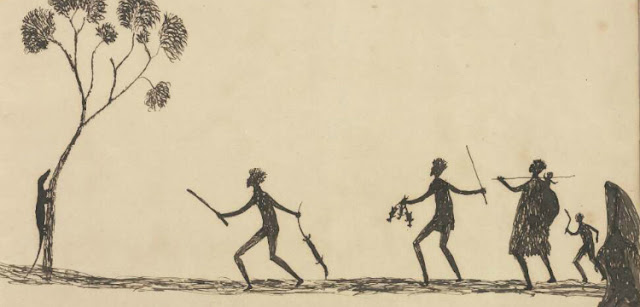What do you understand by the term ‘aborigine’? How is their point of view represented in Australian literature
The term "Aborigine" refers to the Indigenous
peoples of Australia, also known as Aboriginals. The Indigenous peoples of
Australia have a rich and diverse culture and have been living in the continent
for tens of thousands of years prior to the arrival of Europeans.
In Australian literature, the point of view of Aborigines is
often represented through the themes of colonization, displacement, and loss of
land, culture and identity. Indigenous writers have used literature as a medium
to express their experiences, stories, and perspectives. The literature written
by Indigenous Australians often deals with the impact of colonization, the loss
of land, culture, and identity, and the ongoing struggle for Indigenous rights.
Many Indigenous writers have also used literature as a way to
reclaim and preserve their culture, stories, and history. Their literature
provides an insight into the Indigenous worldview, and it is often used to
challenge stereotypes and misconceptions about Indigenous peoples.
What do you understand by the term ‘aborigine’? How is their point
of view represented in Australian literature
In contemporary Australian literature, Indigenous voices are
being increasingly heard and recognized, and Indigenous literature is being
given more attention and recognition. The themes of identity, belonging, and
connection to land are also explored in the works of Indigenous writers, which
give readers a deeper understanding of Indigenous perspectives, experiences and
cultural heritage.
In summary, the term ‘aborigine’ refers to the Indigenous
peoples of Australia, their point of view is often represented in Australian
literature through themes of colonization, displacement, and loss of land,
culture, and identity. Indigenous literature provides a unique insight into the
worldview, culture and history of Indigenous Australians, and is increasingly
being recognized and celebrated in contemporary Australian literature.
What is meant by Aboriginal writing?
Aboriginal writing refers to literature, poetry, and other
forms of written expression produced by Indigenous peoples of Australia. It
includes works written in English, as well as works written in Indigenous
languages, such as Kriol, Yolngu Matha, and Warlpiri.
Aboriginal writing encompasses a wide range of genres,
including fiction, non-fiction, poetry, plays, and children's literature. It
often deals with themes such as identity, belonging, and connection to land, as
well as the impact of colonization and the ongoing struggle for Indigenous
rights. Many Indigenous writers also use literature as a way to reclaim and
preserve their culture, stories, and history.
Aboriginal writing also reflects a unique worldview, and
provides an insight into the experiences and perspectives of Indigenous
peoples. It challenges stereotypes and misconceptions about Indigenous peoples,
and gives readers a deeper understanding of Indigenous culture, heritage and
history.
Aboriginal writing has been traditionally been an oral tradition
and it is only recently that Indigenous peoples have been able to record their
stories and experiences in written form. Nowadays, Indigenous writing is
increasingly recognized and celebrated in Australia and internationally, and
many Indigenous writers have achieved critical acclaim and success.
In summary, Aboriginal writing refers to literature, poetry,
and other forms of written expression produced by Indigenous peoples of
Australia, it reflects a unique worldview, challenges stereotypes and misconceptions,
and provides an insight into the experiences and perspectives of Indigenous
peoples.
How do you define Australian literature
Australian literature refers to the body of literature
produced by writers from Australia or about Australia and its people. It
encompasses a wide range of genres, including fiction, non-fiction, poetry,
plays, and children's literature. It can include works in English, as well as
works in Indigenous languages, such as Kriol, Yolngu Matha, and Warlpiri.
Australian literature is characterized by its diversity,
reflecting the experiences and perspectives of a wide range of people,
including Indigenous Australians, immigrants, and people of different cultural
backgrounds. It often deals with themes such as identity, belonging, and
connection to land, as well as the impact of colonization and the ongoing
struggle for Indigenous rights.
Australian literature also reflects the unique landscape and
environment of the country, and the ways in which it shapes the people who live
in it. It also reflects the cultural and historical context of Australia,
including its history of colonization, the impact of the First and Second World
War, and the impact of technological change on the country and its people.
What do you understand by the term ‘aborigine’? How is their point
of view represented in Australian literature
Australian literature is a dynamic and evolving field, with
new voices and perspectives constantly emerging. It is also increasingly
recognized and celebrated both in Australia and internationally.
In summary, Australian literature refers to the body of
literature produced by writers from Australia or about Australia and its
people, it encompasses a wide range of genres and reflects the diversity,
cultural and historical context of the country and its people.
ALSO READ:-
Discuss Gig Ryan’s work in the context of the notion of Australian ‘mateship’








0 comments:
Note: Only a member of this blog may post a comment.